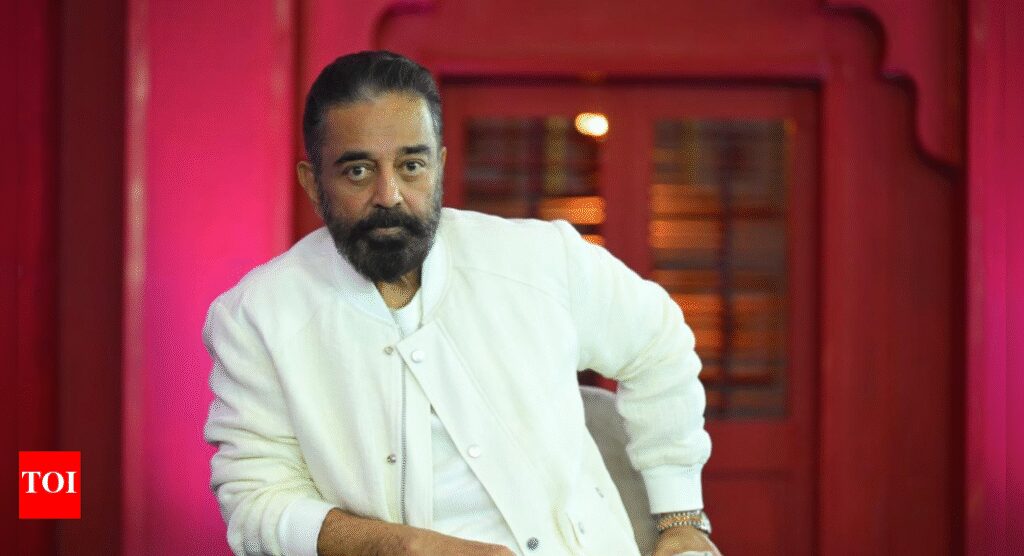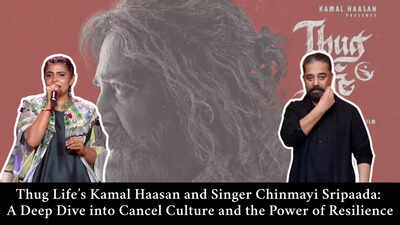Mani Ratnam’s upcoming film ‘Thug Life’ is generating buzz for multiple reasons. Amid the excitement, a shared connection between actor Kamal Haasan and singer Chinmayi Sripaada is making headlines — both have become focal points in ongoing discussions surrounding the persistent cancel culture in the industry.Why has ‘Thug Life’ remained in the headlines since its announcement? One reason is undoubtedly Kamal Haasan’s much-anticipated collaboration with ace filmmaker Mani Ratnam after 38 years — their last being the iconic Nayakan in 1987. The film’s star-studded cast includes Silambarasan, Trisha Krishnan, Abhirami, Aishwarya Lekshmi, Ashok Selvan, Joju George, Nassar, Ali Fazal, Pankaj Tripathi, Rohit Saraf, and Baburaj.The trailer has taken the internet by storm, sparking numerous fan theories and speculations regarding the plot. It begins by portraying Kamal Haasan and Silambarasan as inevitable companions, before shifting in tone as the latter appears to turn against the former. One highlight from the first half of the trailer was a rare glimpse of Kamal Haasan with a clean-shaven look, reminiscent of his appearance in ‘Nayakan’, which gave fans goosebumps.Another moment that grabbed attention was Kamal Haasan romancing Trisha Krishnan in the trailer, reigniting conversations around the age gap between male and female leads. The 28-year age difference between Kamal and Trisha led some critics to question the trend of senior male actors being paired with much younger female co-stars. Responding to this, Mani Ratnam clarified that audiences should view them not as actors but as characters essential to the storyline. He added that relationships with large age gaps are not uncommon in real life and cinema should reflect that reality.Kamal Haasan’s Remark on Tamil and KannadaAmid all the excitement, one remark by Kamal Haasan at the Thug Life pre-release event sparked controversy among Kannada-speaking communities. While welcoming his friend, actor Shiva Rajkumar, he commented that “Kannada was born out of Tamil.” The statement provoked backlash from certain groups in Karnataka, who demanded a public apology. The Karnataka Film Chamber of Commerce (KFCC) announced that they would support calls to ban the film in the state if Haasan did not issue an apology.Kamal Haasan, however, stood firm and told the media: “It is a democracy. I believe in law and justice. My love for Karnataka, Andhra Pradesh, and Kerala is genuine. Nobody will doubt that except those with an agenda. I’ve faced threats before, and if I am wrong, I would apologise — if I’m not, I won’t.”The South Indian Artistes Association (SIAA) later released an official statement in support of Haasan. They warned that the backlash could set a “dark precedent” and threaten artistic freedom and public discourse.“When the legendary Dr Rajkumar was abducted, Kamal Haasan was among the first voices to call for his release. He has always regarded Dr Rajkumar as a brother and holds Dr Shiva Rajkumar in the affection of a son,” the statement added, emphasising Kamal’s bond with the Rajkumar family.“Kamal Haasan is a legendary artist who has transcended caste, religion, race, and language in his service to art. To question his integrity is to insult decades of cultural unity and artistic excellence,” the letter concluded.According to ANI, Kamal Haasan’s team and production house have now approached the Karnataka High Court for permission to release the movie in the state, after the KFCC called for a ban.Ban on Vishwaroopam in 2013Kamal Haasan faced a similar situation in 2013 with the release of Vishwaroopam, which became embroiled in controversy when several Muslim groups alleged the film misrepresented their community. The Tamil Nadu government, then led by Chief Minister J. Jayalalithaa, imposed a two-week ban, despite the film being released without issues in neighbouring states. This dealt a massive blow to Haasan, who had invested heavily as the writer, director, producer, and lead actor. At one point, he stood on the verge of bankruptcy.
During a press conference in Mumbai in January 2013, Haasan expressed his anguish and hinted at the possibility of leaving the country if such setbacks continued. In Chennai, hundreds of fans gathered outside his Alwarpet residence in solidarity. Addressing them from his home, Haasan gave a heartfelt speech that resonated widely:“What I expressed to you all is sorrow, not anger. If you feel the same, share your sorrow — not rage. Among my admirers are Muslim brothers, who are also your brothers. True heroism lies in non-violence. Let us stand united — Muslims and non-Muslims alike. If something regrettable occurs before the verdict, the blame will fall on me. Let there be no politics here. We are all children of this land, and we must protect it. As your elder brother, I urge you all — return home peacefully. I am a Tamilian, and my life belongs to cinema. As long as cinema lives, I will be here to entertain you.”Chinmayi Sripaada stealing the spotlight with ‘Muththa Mazhai’
Singer Chinmayi Sripaada’s rendition of the track ‘Muththa Mazhai’, originally sung by Dhee for Thug Life, has taken social media by storm. Netizens are collectively asking where she had been all these years and questioning who decided to sideline and ban her. Fans and music lovers are flooding platforms with support.Chinmayi’s performance served as a reminder of her long-standing struggle with industry bias. In 2018, during India’s #MeToo movement, she publicly accused lyricist Vairamuthu of sexual misconduct and supported other women with similar allegations. Her vocal stance against Radha Ravi — then President of the South Indian Cine, Television Artistes, and Dubbing Artistes Union (SICTADAU) — led to her removal from the union. Since then, she has faced an unofficial ban and been largely excluded from the industry.Recently, when asked how she managed to work on films like 96 and Leo despite the ban, Chinmayi addressed the matter on X (Formerly Twitter): “96 was before #MeToo broke out. Leo — I was hired despite the ban, and Radha Ravi’s union tried to find out who recorded me so they could ban the recording engineer as well. Nobody has the bandwidth to fight these battles when a film is about to release. Radha Ravi sends diktats to all unions, saying a person is banned, so other unions should not hire them either. Many have faced the same. Incidentally, Anbariv were also banned by their union but were granted relief by the court. I’ve been fighting my case for over six years. That’s how it works.”Chinmayi’s unwavering resistance to silencing and exclusion continues to strike a chord with many , within the industry and beyond.


